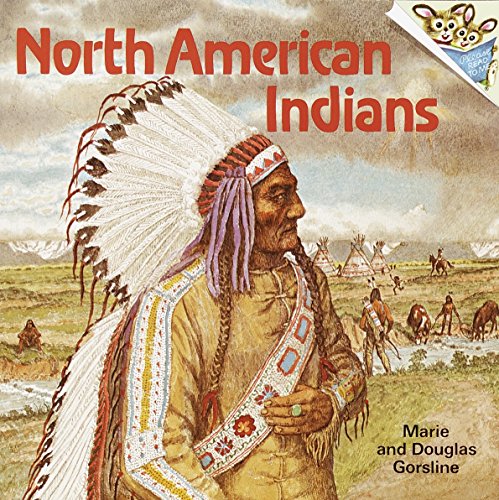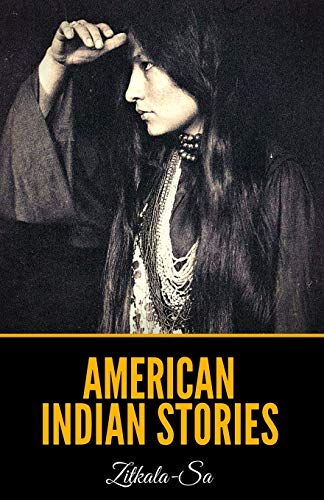-
American Indians
Frederick Starr
eBook (, April 25, 2011)This book was converted from its physical edition to the digital format by a community of volunteers. You may find it for free on the web. Purchase of the Kindle edition includes wireless delivery.
-
North American Indians
Douglas Gorsline
Paperback (Random House Books for Young Readers, April 12, 1978)Celebrate the history, cultures, and traditions of over 12 Native American peoples! This classic, easy-to-read picture book is the perfect introduction to the first Americans, including the Seminole, Iroquois, Sioux, Hopi, and many more. P
P
-
Indian Americans
Scott Ingram
Hardcover (Lucent, July 3, 2003)Reviews the reasons why Indians immigrated to America, what their passage was like, the kind of jobs most found, communities they formed, and their contributions to American culture. P
P
-
Meet North American Indians
Elizabeth Payne
Hardcover (Random House Books for Young Readers, Oct. 12, 1965)A brief survey of life in five North American Indian tribes--Makah, Hopi, Creek, Penobscot, and Mandan--at the time Columbus arrived in the New World. O
O
-
American Indian Stories
Zitkala-Sa
Paperback (Independently published, Oct. 7, 2019)A wigwam of weather-stained canvas stood at the base of some irregularly ascending hills. A footpath wound its way gently down the sloping land till it reached the broad river bottom; creeping through the long swamp grasses that bent over it on either side, it came out on the edge of the Missouri.Here, morning, noon, and evening, my mother came to draw water from the muddy stream for our household use. Always, when my mother started for the river, I stopped my play to run along with her. She was only of medium height. Often she was sad and silent, at which times her full arched lips were compressed into hard and bitter lines, and shadows fell under her black eyes. Then I clung to her hand and begged to know what made the tears fall."Hush; my little daughter must never talk about my tears"; and smiling through them, she patted my head and said, "Now let me see how fast you can run today." Whereupon I tore away at my highest possible speed, with my long black hair blowing in the breeze.I was a wild little girl of seven. Loosely clad in a slip of brown buckskin, and light-footed with a pair of soft moccasins on my feet, I was as free as the wind that blew my hair, and no less spirited than a bounding deer. These were my mother's pride,—my wild freedom and overflowing spirits. She taught me no fear save that of intruding myself upon others.Having gone many paces ahead I stopped, panting for breath, and laughing with glee as my mother watched my every movement. I was not wholly conscious of myself, but was more keenly alive to the fire within. It was as if I were the activity, and my hands and feet were only experiments for my spirit to work upon.Returning from the river, I tugged beside my mother, with my hand upon the bucket I believed I was carrying. One time, on such a return, I remember a bit of conversation we had. My grown-up cousin, Warca-Ziwin (Sunflower), who was then seventeen, always went to the river alone for water for her mother. Their wigwam was not far from ours; and I saw her daily going to and from the river. I admired my cousin greatly. So I said: "Mother, when I am tall as my cousin Warca-Ziwin, you shall not have to come for water. I will do it for you."- Taken from "American Indian Stories" written by Zitkala-Sa
-
American Indian Stories
Zitkala-Sa
eBook (Digireads.com, July 1, 2004)Zitkala-Sa (1876-1938) was a pioneering voice in the movement for Native American rights. Born on a Sioux reservation in South Dakota, she spent her life as an activist working to bring the history and cultural concerns of Native Americans to the broader public. In "American Indian Stories" (1921), her most famous work, Zitkala-Sa draws upon her experience as a Native American child faced with the reality of cultural submission. A collection of fiction and non-fiction, "American Indian Stories" explores the pressures Native Americans faced to assimilate to white American culture. Zitkala-Sa later established and presided over the National Council of American Indians, helping to further the interests of American Indians. These stories and tales create an intimate portrait of the rich cultural history of the American Indian, and double as source material from one of America's most successful Native American activists.
-
American Indian Stories
Zitkala-Sa, Nancy Lee, CoolBeat Audiobook Publishing
Audiobook (CoolBeat Audiobook Publishing, Oct. 2, 2009)Based on the life of the author and members of her tribe, these stories provide a revealing glimpse into the world of the Dakota-Sioux at the turn of the last century. This audiobook consists of several distinct parts. Part One is based on the experiences of the author, and describes a young girl growing up in a changing environment. Part Two consists of revealing stories about other members of her tribe. In the Outro, the author decries the handling of America's Indian problem.
-
American Indian Stories
Zitkala-Sa, Layli Long Soldier
Paperback (Modern Library, May 21, 2019)A groundbreaking Dakota author and activist chronicles her refusal to assimilate into nineteenth-century white society and her mission to preserve her culture—with an introduction by Layli Long Soldier, winner of the National Book Critics Circle Award and the PEN/Jean Stein Book Award for Whereas Bright and carefree, Zitkála-Šá grows up on the Yankton Sioux reservation in South Dakota with her mother until Quaker missionaries arrive, offering the reservation’s children a free education. The catch: They must leave their parents behind and travel to Indiana. Curious about the world beyond the reservation, Zitkála-Šá begs her mother to let her go—and her mother, aware of the advantages that an education offers, reluctantly agrees. But the missionary school is not the adventure that Zitkála-Šá expected: The school is a strict one, her long hair is cut short, and only English is spoken. She encounters racism and ridicule. Slowly, Zitkála-Šá adapts to her environment—excelling at her studies, winning prizes for essay-writing and oration. But the price of success is estrangement from her cultural roots—and is it one she is willing to pay? Combining Zitkála-Šá’s childhood memories, her short stories, and her poetry, American Indian Stories is the origin story of an activist in the making, a remarkable woman whose extraordinary career deserves wider recognition.The Modern Library Torchbearers series features women who wrote on their own terms, with boldness, creativity, and a spirit of resistance.
-
American Indians
Frederick Starr
language (Didactic Press, Nov. 17, 2014)We all know how the native Americans found here by the whites at their first arrival, came to be called Indians. Columbus did not realize the greatness of his discovery. He was seeking a route to Asia and supposed that he had found it. Believing that he had really reached the Indies, for which he was looking, it was natural that the people here should be called Indians...
-
North American Indian Arts
Andrew Hunter Whiteford, Owen Vernon Shaffer
Paperback (Golden Guides from St. Martin's Press, April 14, 2001)Indian Arts is a fascinating introduction to the arts and crafts reflected in the material culture of North American Indians. Knowledge of the skills and techniques developed by the various tribes, and the fine materials produced provides a key to understanding the rich diversity of native cultures. Packed with information and authentic full-color illustrations, this handsome guide will be welcomed by everyone interested in American cultural history.
-
American Indians
Frederick Starr
Paperback (CreateSpace Independent Publishing Platform, Aug. 16, 2014)This book about American Indians is intended as a reading book for boys and girls in school. The native inhabitants of America are rapidly dying off or changing. Certainly some knowledge of them, their old location, and their Native American culture ought to be interesting to American children.
-
North American Indian Arts
Andrew Hunter Whiteford, Herbert Spencer Zim, Owen Vernon Shaffer
Paperback (Golden Press, Jan. 1, 1990)An illustrated guide to North American Indian arts and crafts.